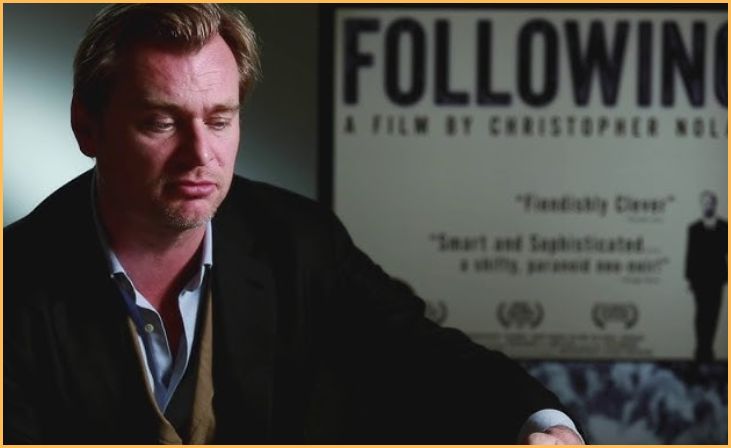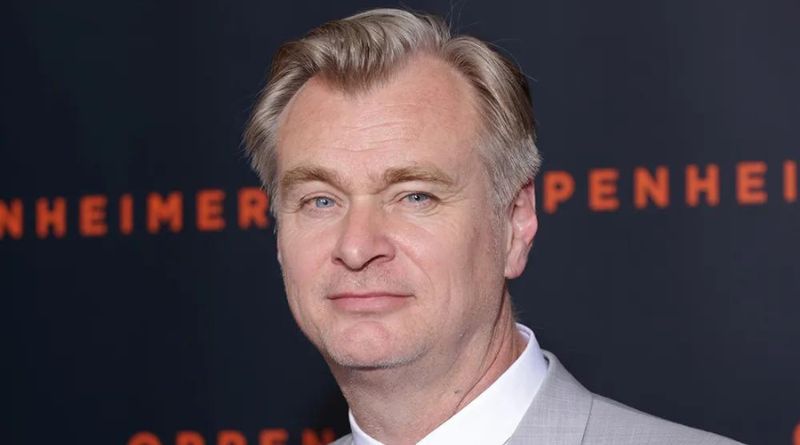Christopher Nolan Movies – Christopher Nolan, a luminary in contemporary filmmaking, has etched his name in cinema history with a distinctive blend of cerebral narratives and visual grandeur. Renowned for his intricate storytelling, Nolan has cultivated a signature style marked by mind-bending plots and exploration of themes like time, memory, and identity.
From his early works such as “Memento” and “Following” to the groundbreaking “Inception” and the epic “The Dark Knight Trilogy,” Nolan’s films have consistently pushed the boundaries of conventional storytelling.
With a penchant for non-linear structures and complex characters, Nolan’s contribution to the art of filmmaking is an immersive journey into the realms of the mind and the metaphysical.
As we delve into the intricacies of his cinematic universe, Nolan’s impact on the industry becomes an undeniable force, reshaping perceptions of narrative complexity and visual storytelling.
Christopher Nolan Movies
Following (1998)

“Following” is Christopher Nolan’s debut feature film, released in 1998. This neo-noir psychological thriller follows an unnamed protagonist who becomes entangled with a charismatic but mysterious burglar. Shot on a modest budget in black and white, the film showcases Nolan’s early narrative complexity and non-linear storytelling.
The protagonist, an aspiring writer, begins to shadow strangers in London, leading to a series of unexpected twists and turns. As the intricate plot unfolds, “Following” explores themes of obsession, identity, and the consequences of our choices.
Despite its limited release and resources, the film laid the foundation for Nolan’s distinctive filmmaking style and storytelling prowess.
Also, Read – Best Action Movies Of All Time
Memento (2000)
Released in 2000, “Memento” is a mind-bending psychological thriller directed by Christopher Nolan. The film follows Leonard Shelby, portrayed by Guy Pearce, who suffers from short-term memory loss, seeking to avenge his wife’s murder.
Unfolding in reverse chronological order, each scene reveals fragments of the puzzle, challenging viewers to piece together the narrative alongside the protagonist. Leonard’s reliance on Polaroid photographs and tattoos as memory aids adds to the film’s unique structure.
“Memento” explores themes of memory, perception, and the consequences of an untrustworthy mind, creating an immersive and thought-provoking experience that solidified Nolan’s reputation for innovative storytelling in the early 2000s.
Insomnia (2002)
Christopher Nolan’s “Insomnia,” released in 2002, is a psychological thriller that delves into the complexities of guilt and morality. Starring Al Pacino, Robin Williams, and Hilary Swank, the film revolves around a seasoned detective (Pacino) sent to investigate a murder in a small Alaskan town.
Battling both a persistent daylight due to the location and his own internal demons, the detective becomes entangled in a cat-and-mouse game with the suspect (Williams).
As the lines between right and wrong blur, “Insomnia” masterfully explores the psychological toll of crime-solving, offering a tense and morally ambiguous narrative that showcases Nolan’s adept direction and storytelling skills.
Batman Begins (2005)
“Batman Begins” (2005) marks Christopher Nolan’s reimagining of the iconic superhero’s origin story. Starring Christian Bale as Bruce Wayne/Batman, the film explores the transformation of a disillusioned billionaire into Gotham City’s masked vigilante.
Nolan brings depth to the character, delving into Wayne’s training with the League of Shadows, led by Ra’s al Ghul (Liam Neeson). Focused on realism and psychological depth, the film rejuvenates the Batman franchise, steering it away from campiness.
Nolan’s gritty vision, coupled with a stellar cast including Michael Caine and Gary Oldman, sets the stage for a darker, more grounded superhero saga, establishing the foundation for “The Dark Knight” trilogy’s success.
Also, Read – Jason Statham Best Movies Ever
The Prestige (2006)

Christopher Nolan’s “The Prestige” (2006) is a spellbinding drama that explores the intense rivalry between two Victorian-era magicians, played by Hugh Jackman and Christian Bale. Set against the backdrop of obsession and deception, the film intricately weaves a narrative of illusions and sacrifices.
As the magicians engage in a relentless quest to outdo each other’s tricks, the boundaries between reality and illusion blur. Nolan masterfully constructs a tale filled with twists and turns, examining the cost of ambition and the lengths one might go to achieve greatness.
With stellar performances, intricate plotting, and thematic depth, “The Prestige” stands as a cinematic marvel within Nolan’s impressive body of work.
The Dark Knight (2008)
“The Dark Knight” (2008), directed by Christopher Nolan, is a superhero masterpiece that transcends the genre. Starring Christian Bale as Batman and Heath Ledger in a legendary performance as the Joker, the film explores the chaotic clash between order and anarchy in Gotham City.
Nolan’s dark and gritty vision, coupled with a morally complex narrative, elevates the superhero genre to new heights. Ledger’s portrayal of the Joker is particularly iconic, earning posthumous acclaim.
The film is a thrilling exploration of heroism and villainy, featuring intense action sequences, intricate storytelling, and profound themes that resonate beyond the realm of comic book adaptations.
Inception (2010)
Christopher Nolan’s “Inception” (2010) is a mind-bending heist thriller that explores the surreal landscape of dreams. Starring Leonardo DiCaprio as Dom Cobb, a skilled extractor who steals secrets from within the subconscious, the film introduces the concept of shared dreaming.
Assembling a team for a complex mission, Cobb navigates layers of reality, blurring the boundaries between dreams and consciousness. Nolan’s visionary direction, coupled with Hans Zimmer’s iconic score, creates a cinematic experience that challenges perceptions of reality.
With stunning visuals, intricate storytelling, and a stellar ensemble cast, “Inception” is a labyrinthine journey that captivates audiences, leaving them questioning the nature of reality long after the credits roll.
The Dark Knight Rises (2012)
“The Dark Knight Rises” (2012), directed by Christopher Nolan, concludes his Batman trilogy with epic grandeur. Set eight years after the events of “The Dark Knight,” Christian Bale reprises his role as Bruce Wayne/Batman.
Facing a new threat in the form of the formidable Bane (Tom Hardy), Wayne must rise from the shadows to protect Gotham City. The film explores themes of redemption, sacrifice, and the resilience of the human spirit.
Nolan delivers intense action sequences, complemented by an ensemble cast including Anne Hathaway as Selina Kyle/Catwoman. With a fitting and emotionally resonant conclusion, “The Dark Knight Rises” completes the trilogy on a powerful and satisfying note.
Interstellar (2014)
Christopher Nolan’s “Interstellar” (2014) is a visually stunning and emotionally charged sci-fi epic. Starring Matthew McConaughey as Cooper, a former NASA pilot, the film follows a desperate mission to find a new habitable planet for humanity.
Exploring themes of love, time dilation, and the human spirit, Nolan crafts a space odyssey that combines breathtaking visuals with intricate scientific concepts.
Hans Zimmer’s haunting score enhances the emotional impact, while the stellar cast, including Anne Hathaway and Jessica Chastain, delivers powerful performances.
With a narrative that transcends space and time, “Interstellar” is a cinematic journey that captivates the mind and heart, leaving a lasting impression.
Dunkirk (2017)

“Dunkirk” (2017), directed by Christopher Nolan, is a war film that immerses viewers in the harrowing evacuation of Allied soldiers from the beaches of Dunkirk during World War II. Nolan masterfully weaves together three timelines—land, sea, and air—creating a tense and non-linear narrative.
With minimal dialogue, Hans Zimmer’s intense score, and breathtaking practical effects, the film captures the chaos and desperation of war. Featuring a cast including Fionn Whitehead, Tom Hardy, and Mark Rylance, “Dunkirk” is a visceral and immersive cinematic experience.
Nolan’s unique storytelling approach and commitment to realism deliver a powerful portrayal of survival, sacrifice, and the resilience of the human spirit in the face of adversity.
Conclusion
In conclusion, Christopher Nolan’s cinematic odyssey has left an indelible mark on the landscape of modern filmmaking. Through his mastery of intricate narratives, exploration of profound themes, and commitment to practical effects, Nolan has redefined storytelling conventions.
His impact extends beyond individual films, shaping the expectations of audiences and inspiring a new era of filmmakers.
As we anticipate Nolan’s future endeavors, his legacy remains a testament to the power of imagination and the boundless possibilities within the realm of storytelling.
FAQs
Nolan frequently employs non-linear storytelling, disrupting chronological order to create suspense and engage audiences. “Memento” and “Inception” are notable examples where he plays with time, enhancing the complexity of the narrative.
Nolan is known for favoring practical effects over CGI whenever possible. He emphasizes real-world locations and tangible elements, providing a visceral and authentic feel to his films, like the rotating hallway scene in “Inception.”
Nolan’s “Dark Knight Trilogy” redefined superhero films, introducing a darker and more realistic tone. The trilogy explored themes of fear, justice, and the complexities of the human condition, with Heath Ledger’s portrayal of the Joker in “The Dark Knight” earning particular acclaim.

